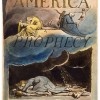
Diane Piccitto, “On 1793 and the Aftermath of the French Revolution”
In 1789, many British radicals interpreted the early events of the French Revolution in mythic terms, as signs that a cataclysmic event, akin to the Christian apocalypse (entailing the renovation of the fallen world), was at hand—and that, paradoxically, human beings rather than God were the agents of this absolute change. However, two major events in 1793 undermined the optimism of these readings: the regicide of Louis XVI and the start of the subsequent Reign of Terror. These disturbing events left many radicals questioning the viability of revolution and, more specifically, the efficacy of violence in producing fundamental and widespread change for the better. Using William Blake’s America as a case study, this article examines how the violence of 1793 not only complicated and ultimately terminated the possibility of interpreting the revolutionary events in France as a fulfillment of the grand biblical narrative of human regeneration but also placed in doubt the potential for human interventions in the historico-political realm to ever initiate this new world.
